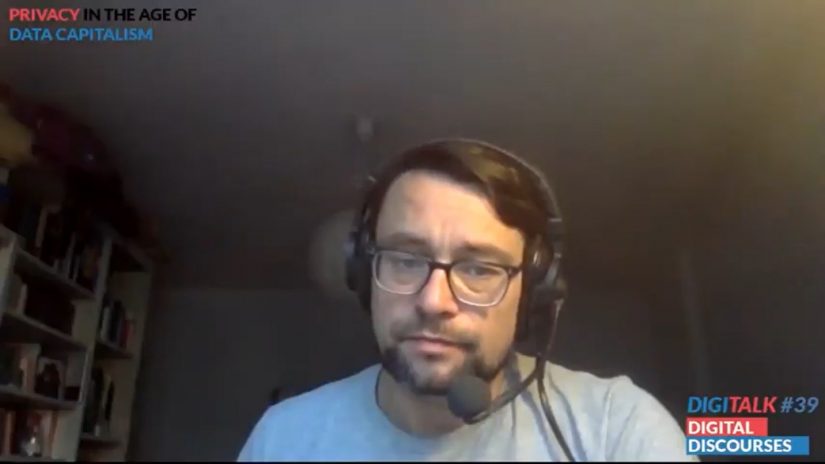
Yogyakarta, April 20th 2020—CfDS UGM held Digitalk #39 Digital Discourses with “Privacy in the Age of Data Capitalism” as the theme. These events were held from Monday, April 20th to Thursday, April 30th 2020 through CfDS UGM’s Youtube channel. CfDS held this event with the help of Goethe Institut Indonesien, ELSAM, and ICT Watch. The speaker of the event was from Germany, Malaysia, Thailand, and also Indonesia. This series of the digital discourses are meant to explore the effect of digital transformation towards the community, politics, economy, and our environment. Digitalk #39 started with a keynote session about five unsettling questions on digital capitalism which was presented by Michael Seemann.
Seeman started the talk with a description of the reality we are living in which is a world that is faced with global capitalism and a lot of crises. Digital capitalism, which was the essence of this talk, can be seen in a lot of forms such as information, platform, data, and cognitive capitalism.
Seeman then explained the definition of capitalism which is best summarized through 5 points; private capital ownership, contradiction between capitalist and labor, the market mechanism in economy, the domination of property based on its value, and fixation to growth. Seeman’s explanation is based on Karl Marx’s theory. Seeman then explained how today’s capitalism is different from the capitalism defined by Marx. “Today’s private capital have turned into software,” said Seeman as he gave Uber, a big taxi company that doesn’t need much private capital, and Airbnb as a company that doesn’t even need real estate as the example. Seeman also talked about how labor nowadays contributes a lot to companies yet they don’t get a worthy wage. On the other hand, their job is slowly eroded by the presence of artificial intelligence.
The discussion was then followed by an explanation of the five question of digital capitalism that is shown through the change of private capital. Those five questions were a contradiction to Marx’s capitalism. Those question asks whether digital capitalism can still be termed capitalism if it have no private capital like Marx said, if it have an overload of labor, if it is unregulated by the market mechanism, if it disregard property ownership based on value, and if its growth is supported by the diminishing intangible goods.
From that discussion that lasted for 42 minutes, Seeman concluded that digital capitalism has several differences with the normal capitalism. As a new form of capitalism, digital capitalism still imitates capitalism though not in every aspect. The recording of this discussion session has been uploaded and can be seen through CfDS UGM’s Youtube Channel.
